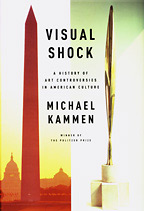Art and outrage: Americans often resist new ideas at first, writes Michael Kammen
By Linda Grace-Kobas

In his new book "Visual Shock" (Alfred A. Knopf), Cornell history professor Michael Kammen explores Americans' relationship with art. Whether it is a memorial for a hero or war dead, a government-funded mural or an abstract vision, art triggers strong reactions.
Americans have debated art since the founding of the republic, Kammen notes. One of the first controversies arose over a statue of George Washington commissioned by Congress in 1833. Sculptor Horatio Greenough idealized the first president as a bare-chested Greco-Roman god enthroned on a pedestal. Nathaniel Hawthorne fumed, "Did anyone ever see Washington naked? It is inconceivable."
Memorial art has generated some of the most heated debates. The Lincoln Memorial and the Vietnam Veterans Memorial were harshly criticized in their early days, only to become revered over time. Today, debates over memorials for the victims of 9/11 evoke similar feelings, Kammen says.
"It is an event whose aftermath has been marred by poor decision-making, political expediency and entrepreneurial greed," comments Kammen, Cornell's Newton C. Farr Professor of American History and Culture. "I do not believe that it is possible at this time to satisfy everyone in a way that would lead to 'healing.' It will require more than a generation to come even close. After all, it took almost a decade for the dissension over the Vietnam Veterans Memorial to calm down, and yet that is -- now -- considered an iconic site."
Kammen began to write about art controversies in the late 1990s after public outrage over works by Robert Mapplethorpe, Andres Serrano, Hans Haacke and others. In 1998 the Supreme Court ruled against the so-called NEA 4, whose grants were revoked because their art was deemed to violate standards of public decency. In 1999 Rudy Giuliani politicized art during his unsuccessful run for the N.Y. Senate, when he condemned an African artist's depiction of the Virgin Mary at a Brooklyn Museum exhibit.
In general, Kammen posits, "Americans have been especially likely to resist modernism in its various phases, and a majority tend to disapprove of government support for the arts."
Kammen is teaching an undergraduate seminar in conjunction with his next project, editing an abridged edition of Alexis de Tocqueville's "Democracy in America."
Among Kammen's many books are "People of Paradox: An Inquiry Concerning the Origins of American Civilization," for which he won the Pulitzer Prize for history in 1972, and "Mystic Chords of Memory: The Transformation of Tradition in American Culture."
--------
Michael Kammen will sign copies of "Visual Shock" at the Cornell Store from 11 a.m. to 1 p.m. Saturday, Oct. 14, joining other faculty authors at the 13th annual Homecoming Book Signing.
Media Contact
Get Cornell news delivered right to your inbox.
Subscribe